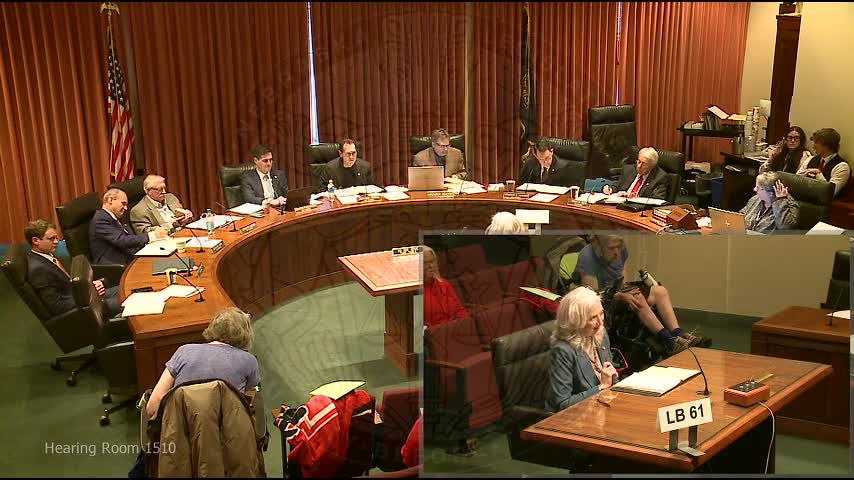Senators hear calls for Medicaid memory‑care rate as providers warn of limited capacity for dementia care
Get AI-powered insights, summaries, and transcripts
Subscribe
Summary
Sen. Tanya Stoehr introduced LB 61 to require DHHS to seek a Medicaid waiver and for the Legislature to appropriate funds for a memory‑care assisted living rate. Providers and advocates urged the committee to expand access and avoid nursing‑home placements; DHHS concerns about fiscal modeling and timing were noted during the hearing.
Sen. Tanya Stoehr told the Health and Human Services Committee that LB 61 would require the Department of Health and Human Services to file an amendment to Nebraska’s home and community‑based services waiver (Aged and Disabled) to create a Medicaid memory‑care rate for assisted living, and would ask the Legislature to appropriate funds to support that rate.
Stoehr described an aging population and rising dementia prevalence—she cited an Alzheimer’s Association estimate of roughly 35,000 Nebraskans 65 and older currently living with Alzheimer’s—and said memory care requires different staffing ratios, secure environments and specialized training than traditional assisted living. She said many people with dementia do not need full nursing‑home care but do need a secure assisted‑living environment with staff trained to manage wandering, behavioral symptoms, and increased personal‑care needs.
A broad set of providers and advocacy organizations testified in favor. Better Senior Living chief operating officer Heath Bodie said his company had identified a rural building suitable for memory care but concluded it would be unsustainable without a Medicaid memory‑care rate. MJ Senior Living president and CEO Marylyn Bolden said typical memory‑care staffing ratios (approximately one staff member to five to seven residents) and programmatic supports make the service more expensive than traditional assisted living; she said current Medicaid waiver rates (the testimony cited waiver monthly equivalents of roughly $3,100 urban / $2,810 rural) fall well short of typical private pay memory‑care costs (testimony cited averages near $6,000–$8,000 per month).
Leading Age Nebraska CEO Kirstin Reed and the Alzheimer’s Association’s Alex DeGarmo emphasized demographic trends and provider closures. Reed provided statewide counts: 280 licensed assisted‑living providers statewide, 197 who take Medicaid waiver, and only 44 who both take Medicaid waiver and hold a memory‑care endorsement. Testimony from several providers described how waiver reimbursement shortfalls lead some facilities to limit or stop accepting Medicaid waiver residents and, in some cases, to close.
Advocates said establishing a memory‑care waiver rate could (1) create a more sustainable payment structure to allow assisted‑living providers to accept more Medicaid waiver residents, (2) reduce inappropriate nursing‑home placements, and (3) help recruit and retain staff.
Witnesses and the sponsor acknowledged the Legislature faces a fiscal modeling challenge. The department’s fiscal note estimated a two‑year fiscal impact (the fiscal note cited figures in the hearing record) and flagged uncertainties including the number of participants who would qualify for memory care and potential offsets if individuals moved from nursing homes into memory care. Sen. Stoehr said the bill is a first step: file the waiver amendment and identify funding; she asked the committee to advance the bill so the state can develop a realistic fiscal model and implementation timeline.
No committee vote occurred. Committee members asked about waiver timing, potential savings from diverting people from nursing homes, and whether a new memory‑care rate would create staffing bottlenecks; proponents said appropriately designed rates would support staffing and avoid long‑term higher Medicaid costs by preventing nursing‑home placements.
